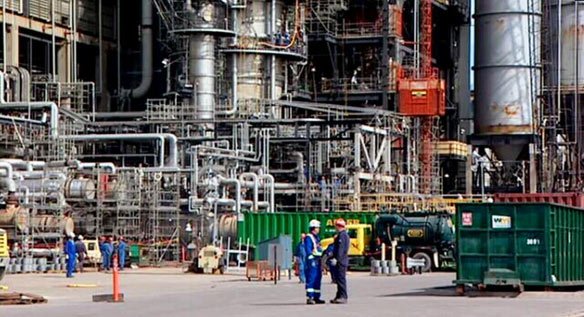
*Date shifted 8 times
Nigeria may not attain its expected petrol sufficiency soonest, as experts have put completion and commencement of operations of the Dangote refinery to 2025.
Commencement of operations of the 650,000 barrels per day facility located at Lekki Free Zone, Nigeria has been shifted eight times.
With a $3.3 billion financing secured since 2013, the refinery was expected to commence production in 2016.
Already behind schedule, construction of the facility owned by Africa’s richest man did not begin until 2016, with planned completion pushed to late 2018.
Major structural construction began in July 2017, while mechanical completion was slated for late 2019 and commissioning in early 2020.
However, the COVID-19 pandemic had put a stop on work due to problems importing steel and other equipment.
Group Executive Director, Dangote Group, Devakumar Edwin, had in an interview with Reuters in August 2019, and implied that operations of the refinery would begin early 2021.
Nigeria said it hoped to solve its crude oil refining, especially that of its petrol needs once the refinery begins operations.
However, with commencement of operations put at 2025, the country may have to continue to rely on importation to solve its needs.
“Construction of the facility isn’t going as earlier planned. It’s being delayed by financing and purchases. So give or take, 2025 is viable” sources had told SweetcrudeReports.
Rumours which had been debunked also had it that the facility is already running into debts which may have delayed its scheduled completion.
By 2025, construction of the largest refinery in Africa would have seen the commencement and end of two presidential administrations- Goodluck Jonathan who witnessed the beginning of the refinery processes, and that of Mohammadu Buhari who approved the country’s acquisition of the 20 percent stake in the project.
State oil company, the Nigerian National Petroleum Corporation, NNPC, recently bought a 20 percent stake in the refinery, and had guaranteed a $3.8 billion- $1 billion cash, the remaining $2.8 billion will be in crude supply.
More marketers, especially under the aegis of the Major Oil Marketers Association of Nigeria, MOMAN, have recently also proposed interest to buy over some equity.
Last week, the Minister of State for Petroleum Resources, Timipre Sylva, still reiterated that Federal Executive Council, FEC approval of the acquisition of 20 percent minority stakes by the NNPC in the refinery.
An email sent to a spokesperson for Dangote is yet to be responded to as at time of filing this report.
What to expect upon commencement of operations
The facility is expected to generate 9,500 direct and 25,000 indirect jobs.
Upon completion, it will process a variety of light and medium grades of crude to produce Euro-V quality clean fuels including gasoline and diesel as well as jet fuel and polypropylene.
The processing facilities include a crude distillation unit (CDU) and associated facilities, a mild hydrocracking (MHC) unit, a residual fluid catalytic cracking (RFCC) unit, a naphtha hydrotreater, and a gasoline hydrodesulfurisation (HDS) unit as well as alkylation units.
The refinery complex will also house sulphur recovery and hydrogen generation facilities and a polypropylene unit. Comprising two steam methane reformer (SMR) units, the hydrogen generation facility will generate 200,000Nm³/h of hydrogen and steam to produce sulphur-free fuels.
The other processing units at the refinery include the STRATCO alkylation unit, the MECS sulphuric acid regeneration (SAR) unit, the MECS DynaWave sulphur recovery unit, and the BELCO EDV fluid catalytic cracking unit. The refinery is designed to produce up to 50 million liters of gasoline and 15 million liters of diesel a day.
The refinery is expected to produce 10.4 million tonnes (Mt) of gasoline, 4.6Mt of diesel, and 4Mt of jet fuel a year. It will also produce 0.69Mt of polypropylene, 0.24Mt of propane, 32,000t of Sulphur, and 0.5Mt of carbon black feed yearly.
SOURCE: sweetcrudereports.com


